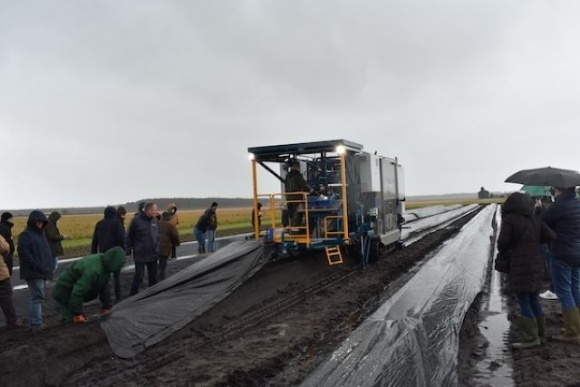Scientists have created a job to collect asparagus
The development of asparagus production in the world, despite the growing demand for it, is constrained by a shortage of labor. And if in Ukraine, Georgia and Moldova, the deficit is only outlined, then in the EU and the United States it is already a huge problem, especially against the background of the difficulties with the migration of seasonal workers during the coronavirus pandemic. It is reported by freshplaza.com.
Therefore, asparagus growers are extremely enthusiastic about any innovations related to mechanization or even robotization of asparagus harvesting. Recently, the first work on the collection of asparagus "Sparter", developed by the Dutch company Cerescon, was presented.

The robot can harvest 2,200 asparagus shoots per hour thanks to a sensor system that detects asparagus up to 10 cm below the surface of the ground. Another significant advantage: the machine can work 24 hours a day at a speed of 1.1 seconds for each asparagus shoot corresponding to an area of 0.3 hectares / hour. The machine replaces 15 to 20 asparagus pickers.
Thanks to two different detectors located 6 cm apart on the same vertical axis, the asparagus is cut to obtain a shoot length of about 22 cm.
Dutch and German growers who protested the machine claim that industrially harvested asparagus is less purple and less curved than asparagus, harvested by hand.
However, there are also disadvantages.
To date, 12 types of damage to asparagus have been identified and analyzed by the manufacturing company with a view to remediation. If the sensors can detect asparagus up to 10 cm below the surface, they still cannot distinguish well between two asparagus growing near each other. There must be enough space between the rows for optimal machine performance.
It also weighs 10.5 tons and costs 375 thousand euros ($ 424 thousand), not counting the annual maintenance costs of almost 10 thousand euros (over $ 11.3 thousand), which makes it too expensive to use. In addition, highly qualified technicians are required to provide technical assistance in the event of a machine breakdown.
According to Christian Befwe, one of the leading experts in asparagus, this robot is a "stepping stone" for the development of the sector.
“It was obvious that we would get there. This is a step. Just as it was when the first machines for harvesting crops in vineyards or bean fields appeared. This does not mean that the asparagus will lose its value. Robotization will lead to market segmentation. Machine-picked asparagus on one side and hand-picked asparagus on the other. Robotization can lead to democratization of asparagus and an increase in market share in the future, ”he notes.